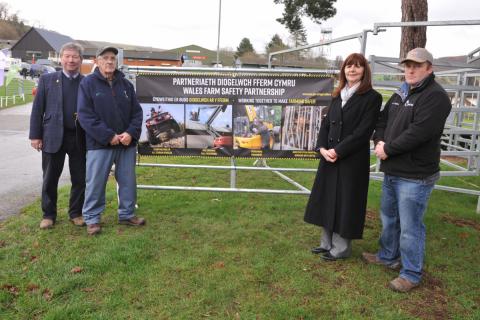12 January 2018
In the last ten years, 388 farmers, their family members or farm workers have been killed on British farms, while thousands more have suffered serious injuries and work-related ill health.
“This is a horrifying statistic, because every fatality, every injury, every illness is one too many and can have catastrophic, life changing effects for farming families,” says Brian Rees, chair of the Wales Farm Safety Partnership (WFSP), and one of the UK’s most well-respected trainers on farm safety.
The role of the WFSP, which is a collaboration between all the key agricultural stakeholder organisations in Wales, is to help raise awareness of the dangers of working on farms to reduce the risk of injuries and accidents to humans in particular, but also to stock.
The WFSP, with support from Farming Connect, recently arranged a series of daily 20 minute workshops, one of which was attended by Lesley Griffiths, Cabinet Secretary for Energy, Planning and Rural Affairs. The training was delivered by two approved Lantra instructors - John Hughes and his son Jimmy who farm together near Llandrindod Wells - when farmers and agriculture students from across Wales learned up to date techniques on safe cattle handling.
“I was especially pleased that so many young farmers and agricultural students attended, which proves we are getting some important messages out to the industry early on in their careers,” said the Cabinet Secretary who heard at first hand from Mr Rees and the two trainers how farmers can take steps to reduce on-farm risks and accidents.
“What they learned that day might just prove a life-saver for some of them and I am confident they will put into practice what they saw demonstrated and learned,” said the Cabinet Secretary.
Mr. Rees explained that handling cattle always involves a risk of injury from crushing, kicking, butting or goring.
“Our workshops demonstrated that there are ways in which you can reduce the risks of accidents and injuries to you, your family and employees or to individuals visiting your stock, such as vets.
“The risk is greater if the animals have not been handled frequently, such as those from hills or moorland, sucklers or newly calved cattle. But attempting to carry out stock tasks on any unrestrained cattle or with makeshift equipment is particularly hazardous, so it is critical that we do all we can to alert farmers to the dangers, and try to prevent them putting their life or health in serious jeopardy,” said Mr Rees.
In addition to emphasising the need to plan ahead when handling large animals, Mr Rees’ top tips include:
- Never underestimate the risk from cattle, especially the protective instincts of a newly calved cow, even with good precautions in place
- Always use proper handling facilities, kept in good working order
- Use a race and a crush suitable for the animals you handle
- Consider a rigorous culling policy for temperamental animals
- Try to avoid working alone but if you do, keep a phone handy
“Statistics show that you are now six times more likely to be killed working on a farm than at a building site, so getting up to speed with all aspects of farm-safety is critically important for farmers of all ages.
“There is support, guidance and training available, so the Wales Farm Safety Partnership will continue to do all it can to persuade farmers to tap into this,” added Mr. Rees.
Eligible farmers registered with Farming Connect can undertake an e-learning module on farm Health & Safety, which is a pre-requisite if you want to apply for machinery handling courses. Further information on all aspects of farm safety is available at www.hse/gov.uk/agricultur

